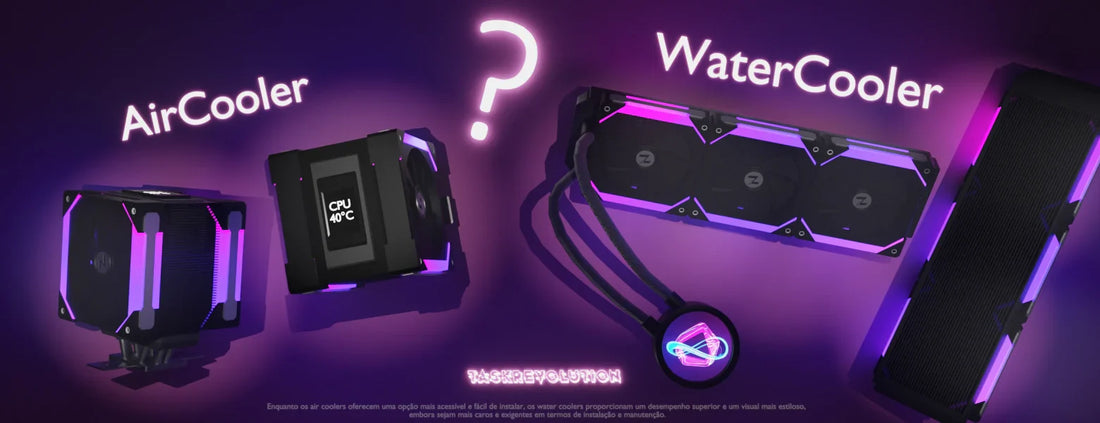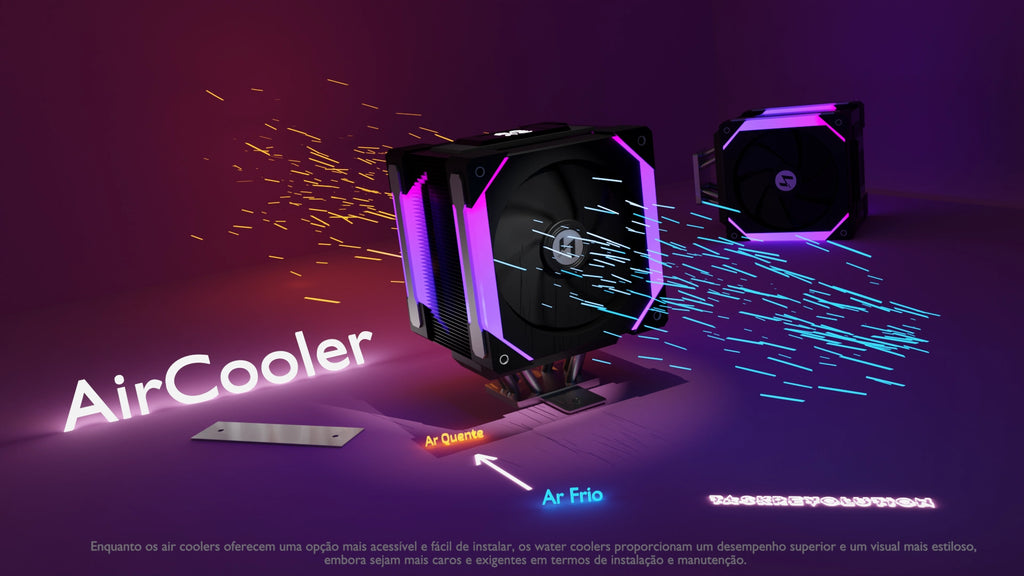
In the battle of cooling: Air Cooler vs. Water Cooler - Which is best for your gaming PC?
CPU Coolers: Air vs Water - Which is Best for Your Gaming Setup?
Let's dive into the world of PC gaming! Yes, we're talking about that crucial component for keeping your processor's heat under control: CPU coolers . Today, the PC world is divided into two tribes: air coolers , which rely on the power of air to keep things cool, and water coolers , which splash with a liquid solution. But which one is best for your gaming setup?
What are the main differences between these coolers?
What is an air cooler?
Before we delve into the cooler wars, it's important to understand the basics. An air cooler is a cooling system that uses the power of air to dissipate heat from your processor. Simple, right? But don't underestimate its effectiveness!
How does an air cooler get rid of heat?
Well, experts explain that air coolers employ a composition of metals, commonly copper, aluminum, and in some cases silver, to absorb and conduct heat away from the processor. Copper tubes, known as heatpipes , are responsible for transporting this heat to small metal plates called heatsinks (or fins), where one or two fans come into action to dissipate this heat away.
Imagine, your processor is overheating and desperately needs cooling. It transfers heat to the base of the cooler (contact plate), which in turn sends the heat to the heatpipes. These are responsible for sending the heat to the fins, where the fans kick in and expel the heat out of your case. It's like a game of pass-the-hot card, but with electronic components!

So, what are the advantages and disadvantages of air coolers?
Air coolers are the true "tanks" of cooling: robust and reliable. Their main advantages include:
- Cost-effective: Generally more affordable, making them a great option for most budgets.
- Simplicity and Reliability: Fewer moving parts mean less chance of failure. There is no risk of leaks.
- Easy Installation: Assembly is straightforward, ideal for those building their first PC.
- Low Maintenance: Basically, it only requires periodic cleaning of the fans.
- Longevity: They tend to last for many years without the need for component replacement.
The disadvantages, while they exist, are more specific:
- Size: More powerful models can be large and take up a lot of space in the case, making it difficult to install other components or for air circulation.
- Aesthetics: For those seeking a "clean" look or one with lots of LEDs, a large air cooler may not be the most attractive option.
- Extreme Overclocking Performance: For very aggressive overclocking of high-performance CPUs, they may not offer the same level of cooling as a water cooler.
But for most gamers, they get the job done and keep the processor at the ideal temperature!
So what exactly is a water cooler?
Now, let's talk about the wet side of things: water coolers . These rely on a special liquid to keep your processor's temperature under control. Fancy, huh?
And how does this work in practice?
Water coolers are a bit more complex. There are two main types: All-in-One (AIO) systems, which come factory-sealed and are easier to install, and custom loop systems, which are assembled piece by piece, offering maximum customization and performance. Both work on a similar principle:
- Contact Base (CPU Block): The processor's heat is absorbed by a copper or nickel plate.
- Coolant: A pump propels a special liquid (not tap water!) through the contact base, which absorbs heat.
- Tubes: The hot liquid travels through the tubes to the radiator.
- Radiator: The radiator, which is a kind of "honeycomb" with fins, dissipates heat from the liquid into the air.
- Fans: One or more fans attached to the radiator push hot air out of the case.
- Return: The cooled liquid returns to the pump to restart the cycle.
It's an almost magical process that guarantees extremely efficient heat dissipation!

And why choose a water cooler?
If you're dreaming of a top-notch setup, water coolers are the right choice. They offer a number of advantages:
- Superior Cooling Performance: Especially for high-performance CPUs and those who overclock, water coolers offer significantly lower temperatures.
- Enhanced Aesthetics: With a cleaner design, illuminated tubes, and the absence of a large block over the CPU, they contribute to a more modern and elegant look for the case.
- Improved Airflow in the Case: Because they are more compact around the processor, they free up space for air circulation around other components, such as the graphics card and RAM.
- Lower Noise (in some cases): Although the pump and radiator fans produce noise, under high workloads, the efficiency of the water cooler can result in fans spinning at lower speeds, generating less noise than an air cooler at its limit.
But it's not all roses...
Of course, water coolers also have their points to consider:
- Higher Cost: They are significantly more expensive than air coolers, especially custom systems.
- More Complex Installation: Although AIOs are simpler, they still require more care in mounting and radiator positioning. Custom loops are for advanced users.
- Leakage Risk: Although rare in modern AIOs, the risk of liquid leakage exists and can cause serious damage to PC components.
- Maintenance (for Custom Loops): Custom systems require periodic maintenance, such as fluid changes and component cleaning. AIOs are sealed and do not require this maintenance, but the pump may fail over time.
- Pump Lifespan: The pump is a mechanical component with a limited lifespan and can be the first point of failure.
So, how do you decide between an air cooler and a water cooler?
The answer isn't as simple as choosing between Mario and Luigi. You need to consider what you expect from your PC, how much you're willing to spend, and, of course, the look of your setup. To help you decide, think about the following points:
- Budget: If cost is a limiting factor, air coolers offer excellent performance at a much more affordable price.
- CPU Performance: For entry-level to mid-range processors, or for general use and gaming without extreme overclocking, a good air cooler is more than sufficient. For high-performance CPUs, heavy overclocking, or if you're looking for the lowest possible temperatures, a water cooler will be superior.
- Case Aesthetics: If visuals are paramount and you want a cleaner setup or one with prominent RGB lighting, water coolers (especially AIOs with larger radiators) might be more appealing.
- Ease of Installation and Maintenance: Air coolers are more "plug and play" and require less maintenance. All-in-one water coolers are a good middle ground, while custom loops are for enthusiasts.
- Noise Level: Although both generate noise, the perception may vary. Water coolers may be quieter at idle, but radiator fans can be audible under load.
Ultimately, both air coolers and water coolers have their place in the world of gaming PCs. The ideal choice is the one that balances your cooling needs with your budget, aesthetic preferences, and comfort level with installation and maintenance.
So, ready to keep your PC nice and cool while you play that gaming marathon?
